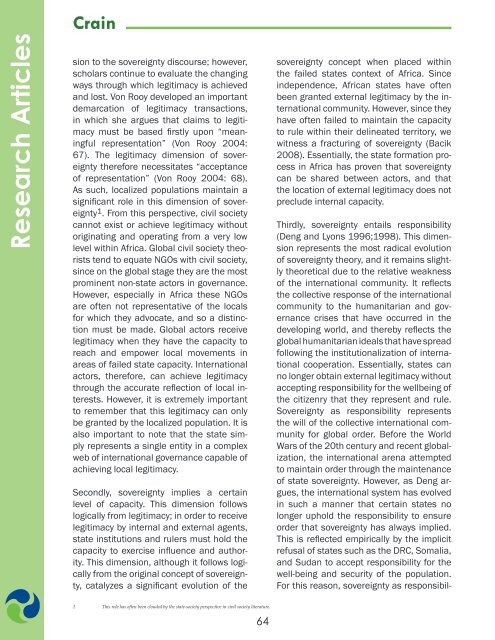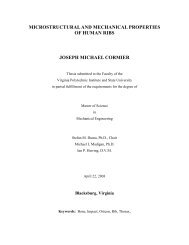Research Articles - VTechWorks - Virginia Tech
Research Articles - VTechWorks - Virginia Tech
Research Articles - VTechWorks - Virginia Tech
You also want an ePaper? Increase the reach of your titles
YUMPU automatically turns print PDFs into web optimized ePapers that Google loves.
<strong>Research</strong> <strong>Articles</strong><br />
Crain<br />
sion to the sovereignty discourse; however,<br />
scholars continue to evaluate the changing<br />
ways through which legitimacy is achieved<br />
and lost. Von Rooy developed an important<br />
demarcation of legitimacy transactions,<br />
in which she argues that claims to legitimacy<br />
must be based firstly upon “meaningful<br />
representation” (Von Rooy 2004:<br />
67). The legitimacy dimension of sovereignty<br />
therefore necessitates “acceptance<br />
of representation” (Von Rooy 2004: 68).<br />
As such, localized populations maintain a<br />
significant role in this dimension of sovereignty<br />
1 . From this perspective, civil society<br />
cannot exist or achieve legitimacy without<br />
originating and operating from a very low<br />
level within Africa. Global civil society theorists<br />
tend to equate NGOs with civil society,<br />
since on the global stage they are the most<br />
prominent non-state actors in governance.<br />
However, especially in Africa these NGOs<br />
are often not representative of the locals<br />
for which they advocate, and so a distinction<br />
must be made. Global actors receive<br />
legitimacy when they have the capacity to<br />
reach and empower local movements in<br />
areas of failed state capacity. International<br />
actors, therefore, can achieve legitimacy<br />
through the accurate reflection of local interests.<br />
However, it is extremely important<br />
to remember that this legitimacy can only<br />
be granted by the localized population. It is<br />
also important to note that the state simply<br />
represents a single entity in a complex<br />
web of international governance capable of<br />
achieving local legitimacy.<br />
Secondly, sovereignty implies a certain<br />
level of capacity. This dimension follows<br />
logically from legitimacy; in order to receive<br />
legitimacy by internal and external agents,<br />
state institutions and rulers must hold the<br />
capacity to exercise influence and authority.<br />
This dimension, although it follows logically<br />
from the original concept of sovereignty,<br />
catalyzes a significant evolution of the<br />
1 This role has often been clouded by the state-society perspective in civil society literature.<br />
64<br />
sovereignty concept when placed within<br />
the failed states context of Africa. Since<br />
independence, African states have often<br />
been granted external legitimacy by the international<br />
community. However, since they<br />
have often failed to maintain the capacity<br />
to rule within their delineated territory, we<br />
witness a fracturing of sovereignty (Bacik<br />
2008). Essentially, the state formation process<br />
in Africa has proven that sovereignty<br />
can be shared between actors, and that<br />
the location of external legitimacy does not<br />
preclude internal capacity.<br />
Thirdly, sovereignty entails responsibility<br />
(Deng and Lyons 1996;1998). This dimension<br />
represents the most radical evolution<br />
of sovereignty theory, and it remains slightly<br />
theoretical due to the relative weakness<br />
of the international community. It reflects<br />
the collective response of the international<br />
community to the humanitarian and governance<br />
crises that have occurred in the<br />
developing world, and thereby reflects the<br />
global humanitarian ideals that have spread<br />
following the institutionalization of international<br />
cooperation. Essentially, states can<br />
no longer obtain external legitimacy without<br />
accepting responsibility for the wellbeing of<br />
the citizenry that they represent and rule.<br />
Sovereignty as responsibility represents<br />
the will of the collective international community<br />
for global order. Before the World<br />
Wars of the 20th century and recent globalization,<br />
the international arena attempted<br />
to maintain order through the maintenance<br />
of state sovereignty. However, as Deng argues,<br />
the international system has evolved<br />
in such a manner that certain states no<br />
longer uphold the responsibility to ensure<br />
order that sovereignty has always implied.<br />
This is reflected empirically by the implicit<br />
refusal of states such as the DRC, Somalia,<br />
and Sudan to accept responsibility for the<br />
well-being and security of the population.<br />
For this reason, sovereignty as responsibil-



